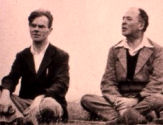
This article was written for The Church of England Newspaper, published on 26th Sept 2019 as “Uncovering the last Inkling”.
Everyone has heard of C.S. Lewis. Not many have heard of Owen Barfield. However, Lewis would not have become the famous author and apologist without the man he called his “oppositional friend”. I have found reading Barfield to be a transformative experience, too.
He was born 20 days before Lewis during the last years of the Victorian era, in 1898. He died several decades after Lewis, in 1997. They met as undergraduates in Oxford and became founding members of the fabled circle known as The Inklings, alongside J.R.R. Tolkien.
At first, Oxford life was not happy for Barfield. He became acutely depressed. In a letter to a friend, he described feeling as if he were falling in on himself “like an ingrowing toe-nail”. He felt suicidal. He came to see that his malaise arose from “the caged materialism of the age”, but a way out of the narrowness presented itself in poetry.
He woke up to the vitality and life conveyed in the words of a poem, as well as other inspired works. He believed that this “secret life” is an imaginative power that reveals nothing less than God’s presence in the world. The Word who became flesh is active in the words we speak, and we can sense it too, if we develop the ears to hear.
For example, the parables of Jesus are not primarily moral tales about how to behave well, Barfield argued. For one thing, if read like that, many of them seem amoral if not immoral. Instead, they are akin to disturbing allegories and strange stories. If we listen to them aright, they imaginatively jolt us out of our suppositions and open our hearts and minds to receive what Jesus called “life in all its fulness”.
The way of flowing images is a way of knowledge as much as rational proof and argument, Barfield said. Lewis had yet to become a Christian and disagreed. They launched into a series of embattled discussions that they called their “Great War”. Where Barfield noticed qualities of God’s spirit echoing in his soul as he read poetry and parables, Lewis held that they were meaningful insofar as they add colour to life. Barfield continued: the way out of the caged materialism of the age is not by finding the argument that proves the existence of God. It is to experience a “felt change of consciousness”. It is to be converted.
The word “felt” in that quote was, in fact, suggested by Lewis after his conversion in 1931. It suggests how Barfield’s insights lie behind his realisation that the historical life of Jesus is a true myth. It’s the product of a change of mind that requires an awakened sense. It can see that within what we call literal events lies a spiritual reality that is in communion with God. Jesus showed it. We can know it.
Little wonder that Lewis dedicated the book he published soon after his conversion, The Allegory of Love, to Barfield, calling him “Wisest and Best of My Unofficial Teachers”. When he wrote the Narnia stories, Lewis memorialised the friendship again. The lead character, Lucy, is named after Barfield’s daughter, to whom Lewis was a godfather.
That said, differences between the two remained. They revolved around Barfield’s profound appreciation of the German philosopher and mystic, Rudolf Steiner. He is known in his native Germany because of his work on Johann Wolfgang von Goethe, but prompts suspicion in the English-speaking world. Lewis shared the dislike. He only once wrote positively about Steiner, in The Abolition of Man: “I hear rumours that Goethe’s approach to nature deserves fuller consideration – that even Dr Steiner may have seen something that orthodox researchers have missed.”
That “something” is a trained imagination which can become a faculty of inspiration and revelation. My sense is that Barfield’s understanding of it shaped Lewis’s work through and through. For example, Lewis makes even more sense when you know about Barfield’s thesis that human beings have lost touch with an experience of the life of God that was once enjoyed by our distant ancestors. Lewis’s notion of “joy” is a distant memory of this older participation. It prompts a desire for a renewed awareness of God in the future.
Lewis felt this would require the radical, even catastrophic, death and rebirth of humanity. Barfield felt we could begin to know it directly now. The disciples did so with the eyes that could see and ears that could hear the resurrected Jesus. Barfield did, too, when he became aware not only of his own inner life but “the inside of the whole world”, as he put it. For myself, I believe Barfield wrote about a way to know the kingdom of God that is already within us. He has crucial insights both for Christianity today and for escaping from the caged materialism that traps us.
Mark Vernon’s new book tells the story of Christianity based on Barfield’s ideas. It is called, A Secret History of Christianity: Jesus, the Last Inkling and the Evolution of Consciousness (John Hunt Publishing).